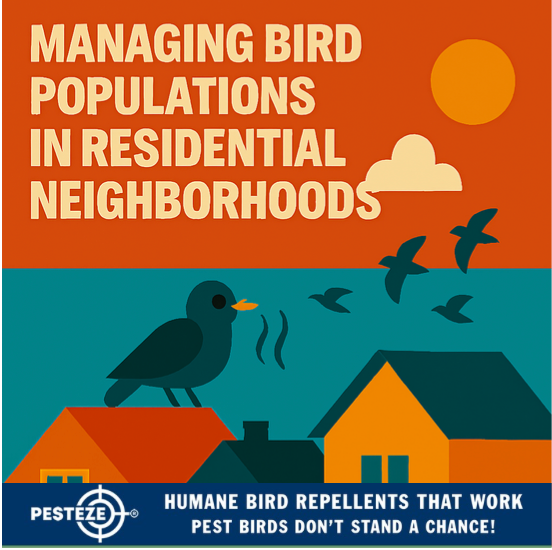MANAGING BIRD POPULATIONS IN RESIDENTIAL NEIGHBORHOODS

MANAGING BIRD POPULATIONS IN RESIDENTIAL NEIGHBORHOODS
SUMMARY
Residential bird population management requires a balanced, scientific approach that protects community health, property integrity, and local ecosystems in 2025.
FEATURES
- Community Health: Comprehensive strategies to mitigate bird-related health risks in residential areas.
- Property Protection: Advanced methods to prevent bird-related damage to homes and landscapes.
- Ecological Balance: Approaches that respect wildlife while maintaining neighborhood safety.
- Sustainable Management: Integrated techniques for long-term bird population control.
- Neighborhood Cooperation: Strategies that encourage community-wide bird management efforts.
GUIDE DESCRIPTION
Residential neighborhoods represent complex ecological environments where human habitation intersects with local wildlife populations. Bird management requires a nuanced approach that balances human needs with ecological preservation, moving beyond simple pest control to comprehensive environmental stewardship.
Urban and suburban landscapes create unique conditions that attract bird populations. Abundant food sources, nesting opportunities, and modified landscapes provide ideal environments for multiple bird species. Understanding these attraction mechanisms becomes crucial for developing effective management strategies.
Technological innovations in 2025 offer sophisticated approaches to bird population management. Advanced sensor networks, intelligent environmental modification techniques, and data-driven population tracking provide unprecedented capabilities for residential bird control.
Effective bird management extends beyond individual property interventions. Neighborhood-wide strategies that combine multiple approaches create more comprehensive and sustainable solutions. Collaborative efforts between residents, local authorities, and environmental experts can develop more effective long-term management techniques.
Community education plays a critical role in successful bird population management. Residents must understand the ecological importance of birds while also recognizing the potential risks associated with uncontrolled populations. Balanced approaches that combine prevention, deterrence, and ecological awareness provide the most effective solutions.
Legal and ethical considerations remain paramount in developing bird management strategies. Many bird species are protected by federal regulations, requiring humane and environmentally responsible approaches to population control.
Sustainable management requires a holistic approach that considers:
- Habitat modification
- Food source reduction
- Humane deterrence techniques
- Community-wide coordination
- Ongoing environmental monitoring
- Pukhraj Sharma


Comments 0